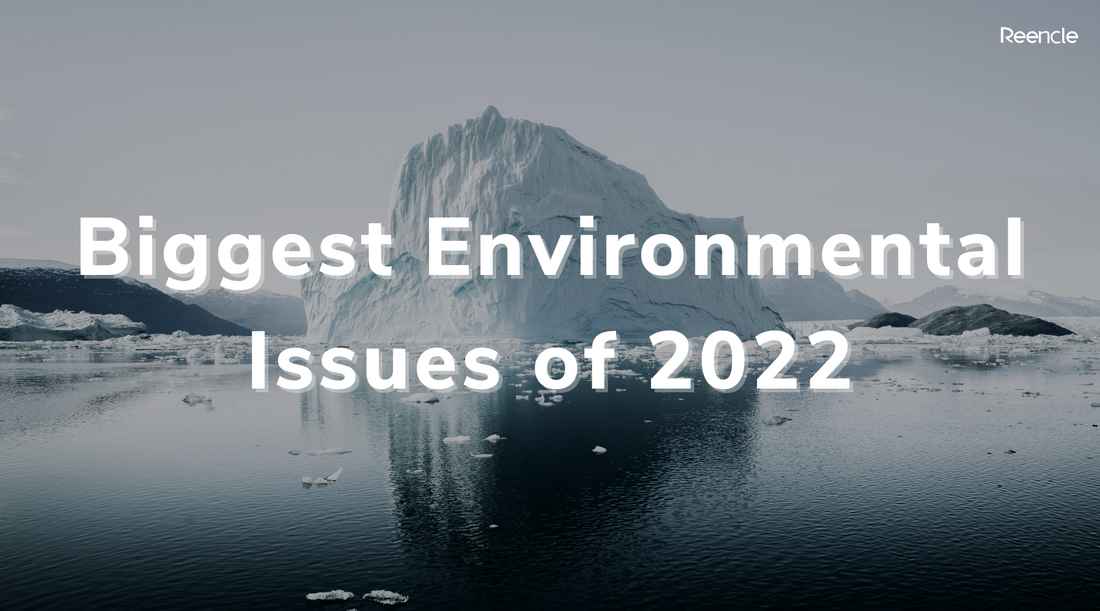In our continued fight for the environment, we’re bound to meet with resistance and unfortunate steps back. The year 2022 was no exception. We saw some incredible Positive Environmental News in 2022, but we also saw some massive issues that shouldn’t be ignored. Awareness always precedes change, which is why we believe it’s important to share with you some of the biggest environmental issues of 2022.

Photo Credit: Eelco Bohtlingk
Fossil Fuels Accelerating Global Warming
The global temperature today is 1.1 Celsius higher than it was before, marking a new high in temperatures. Our planet hasn’t seen temperatures this high in 4 million years, putting us in an unprecedented danger zone.
This temperature rise is leading to catastrophe globally. This past year observed uncontrollable bushfires in Australia and the US, locusts swarming in parts of Africa, Asia and the Middle East leading to crop destruction. Antarctica experienced a heatwave that caused temperatures to rise above 20 degrees Celsius for the first time.
Food Waste At All-Time High
Over a third of the food meant for human consumption was wasted. This means 1.3 billion tons of food that could have fed 3 billion people ended up discarded in landfills. As a result, food waste is now the 3rd highest contributor to greenhouse gas emissions globally.

Photo Credit: Hans Hamann
Melting Ice Caps & Rising Sea Levels
Water is now rising twice as fast as it did in the 20th century, which is incredibly alarming. A few years ago, in 2019, Greenland lost ice sheets of a million tons per minute throughout the year. If Greenland’s entire ice sheets melt, global sea levels will rise by a remarkably damaging 6 meters.
The last fully-intact ice shelf in Arctic Canada recently collapsed, losing about 40% of its area over the span of 2 days in July. If these occurrences continue, they’ll have devastating effects on those in coastal areas. For example, flooding will occur, leading to forced migration which can result in overpopulation and put a strain on resources.

Photo Credit: Francois Le Nguy
Fast Fashion & Textile Waste
We’re seeing a global rise in demand for clothing at an unprecedented level. The fashion industry is now responsible for 10% of global carbon emissions. 20% of global wastewater is also due to textile dyeing.
So far, at least 92 million tonnes of textile waste has been generated, with the number estimated to skyrocket to 134 million tonnes by 2030.
Overfishing
Fish are the primary source of protein for over 3 billion people globally. Today, most people consume twice as much food as they did 50 years ago; there are also four times as many people today as there were in the 1960s. In other words, our demand for fish outweighs the speed at which it can be replenished.
Overfishing also causes damage to the environment including algae increment, destruction of fishing communities, and ocean littering.
Regardless of how many steps back it seems like we've taken, it's never too late to take significant steps forward. Hopefully this article reminds us that our individual actions make up for collective changes that impact us all. In 2023, let's aspire to do better for our planet. If you'd like to know what are some attainable goals you can set for 2023, have a read of our 12 Eco-Friendly Goals For 2023!
Did you know that composting with Reencle reduces up to 90% of your food waste. Food waste that's discarded ends up in landfills where it releases harmful greenhouse gasses that largely contribute to our planet's doom. If you'd like to join us and reduce your food waste by composting with Reencle, sign up for our newsletter here to get an exclusive promo code when you place an order!

